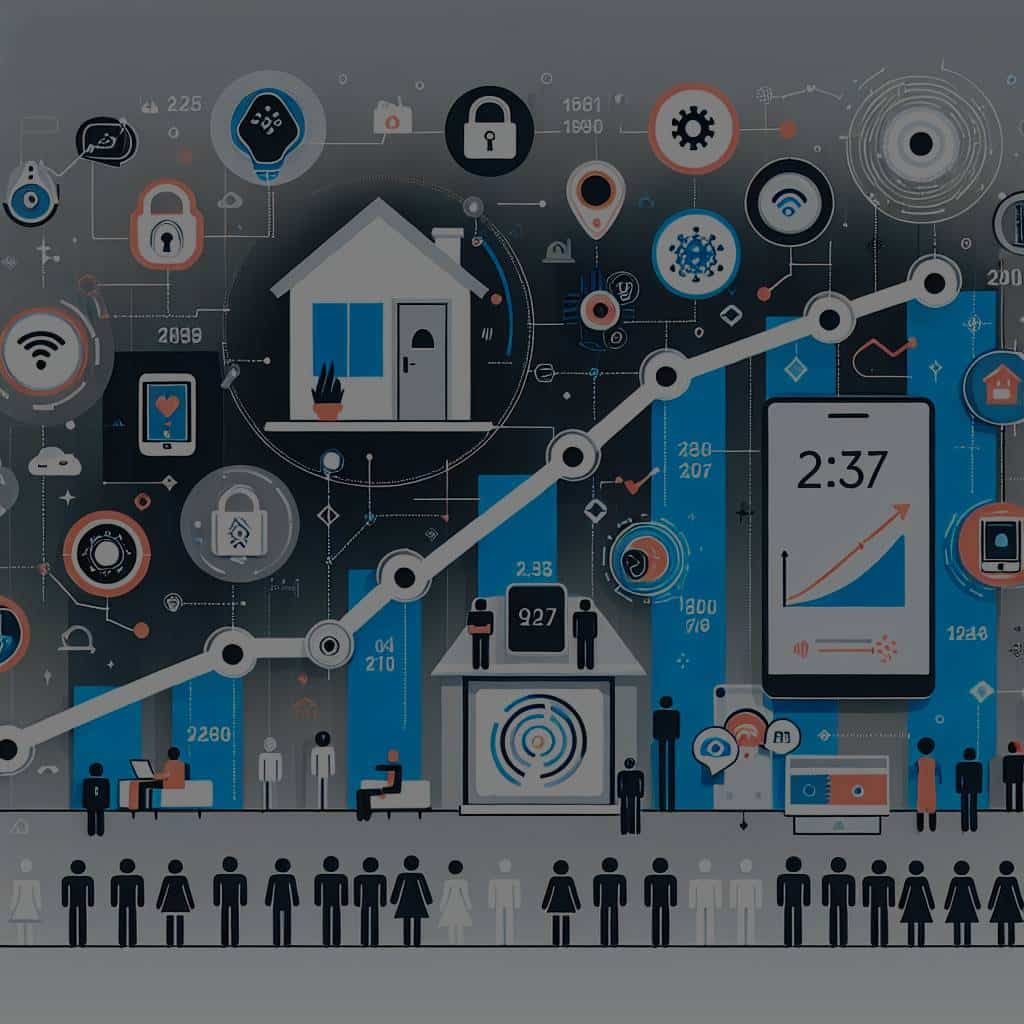The real estate industry has not been immune to the technological revolution. The advent of smart home technology is reshaping property development and the market as a whole. IoT devices, home automation, energy management systems, and virtual homes are no longer futuristic concepts but an integral part of today’s property market landscape. As real estate developers and managers, understanding these trends is critical to staying ahead in the competitive industry. In this article, we will explore the current trends in smart home technology and how they are influencing real estate development.
Virtual Reality (VR) and Augmented Reality (AR) in Real Estate
Virtual and augmented reality technologies are transforming the way you showcase properties to potential buyers. No longer do you have to rely on 2D blueprints or images, virtual homes offer a three-dimensional perspective, allowing buyers to visualize the property more realistically.
This might interest you : How to Develop a Real Estate Investment Strategy Around University Expansion Plans?
Virtual tours have become a popular tool in the real estate market. They offer the convenience of viewing properties remotely, saving time and money on travel. Augmented reality, on the other hand, gives potential homeowners the ability to customize their property by virtually altering interior designs, wall colors, and furniture settings. These technologies not only enhance customer experience but also speed up the decision-making process, consequently boosting sales.
IoT Devices and Home Automation
The Internet of Things (IoT) has brought about a new level of convenience in homes. Smart devices connected to the internet can perform various tasks, from controlling temperature and lighting to security surveillance.
Also to read : Can Vertical Farming Be Integrated into Urban Residential Developments?
Home automation is a growing trend among homeowners due to its potential to enhance the comfort and security of homes. Smart thermostats, for instance, enable energy management by regulating home temperatures based on occupancy and time of day. Smart locks and security cameras, on the other hand, provide homeowners peace of mind by enhancing home security.
Real estate developers are increasingly integrating these devices into new properties to meet the growing demand for smart homes. Besides adding value to properties, smart homes also attract tech-savvy buyers who appreciate the convenience and efficiency of home automation.
Data Analytics in Property Management
Big data plays a crucial role in the real estate industry. From construction and property management to sales, data analytics provides valuable insights that can enhance decision-making processes.
Property management has particularly benefited from data analytics. By analyzing data from various sources, property managers can predict maintenance needs, optimize energy use, and improve tenant satisfaction. For instance, sensors installed in a building can collect data on energy consumption, occupancy, and equipment performance. This data, when analyzed, can help property managers identify inefficiencies and make necessary improvements.
Cybersecurity in Smart Homes
With the increasing adoption of smart home technology, cybersecurity has become a critical concern. Smart devices connected to the internet are vulnerable to cyberattacks, which can compromise the security and privacy of homeowners.
Real estate developers and property managers must prioritize cybersecurity when integrating smart home technology. This includes ensuring secure network connections, regularly updating device software, and educating homeowners on safe practices.
By addressing cybersecurity concerns, you can enhance the appeal of your properties while providing homeowners peace of mind.
Sustainability and Energy Efficiency
Sustainability is a key trend in real estate development. As more people become environmentally conscious, demand for green buildings is on the rise. Smart home technology plays a crucial role in promoting sustainability by enhancing energy efficiency.
Smart thermostats, lighting systems, and appliances can optimize energy use, thereby reducing carbon emissions. Meanwhile, renewable energy technologies, such as solar panels and wind turbines, can generate clean energy for homes.
As a real estate developer, integrating these sustainable technologies into your properties not only makes them more appealing to environmentally conscious buyers but also contributes to the global green movement.
In conclusion, smart home technologies are revolutionizing the real estate industry. By staying abreast of these trends and adopting them in your properties, you can enhance their value, appeal to modern homebuyers, and ensure your competitiveness in the market.
Artificial Intelligence (AI) in Real Estate
Artificial Intelligence (AI) is another trend influencing the real estate industry. AI involves using algorithms and machine learning to mimic human intelligence. In the context of real estate, AI can analyze data, predict trends, and automate tasks, which can significantly enhance productivity and decision-making.
One of the primary applications of AI in real estate is in property valuation. AI algorithms can evaluate vast amounts of data, including property features, market trends, and neighborhood characteristics, to accurately predict property values. This not only helps estate agents to price properties realistically but also assists buyers and investors in making informed decisions.
AI is also transforming customer service in the real estate industry. With the use of AI chatbots, property management companies can provide round-the-clock customer service, answering queries and resolving issues promptly. AI chatbots can also handle multiple requests simultaneously, thereby enhancing efficiency and customer satisfaction.
Furthermore, AI can automate routine tasks in property management, such as scheduling maintenance, tracking rent payments, and monitoring property performance. This not only frees up time for property managers but also reduces the risk of human error.
As a real estate developer or manager, harnessing the power of AI can significantly enhance your competitiveness in the market. By automating tasks and making data-driven decisions, you can boost productivity and profitability.
Mobile App Development in Real Estate
Mobile app development is another trend that’s shaping the real estate industry. With the widespread use of smartphones, real estate apps have become an essential tool for homebuyers, renters, and property managers.
For homebuyers and renters, real estate apps provide the convenience of browsing properties, scheduling viewings, and even making payments right from their mobile devices. These apps can also send notifications about new listings or price changes, keeping users updated on the latest market trends.
For property managers, real estate apps can automate various tasks, such as tracking rent payments, scheduling maintenance, and communicating with tenants. These apps can also integrate with smart home devices, enabling property managers to control home automation systems remotely.
Moreover, mobile apps can provide a platform for virtual reality and augmented reality experiences. Users can take virtual tours of properties or visualize different interior designs, enhancing their property viewing experience.
As a real estate developer, investing in mobile app development can attract tech-savvy buyers and renters, enhance customer service, and boost operational efficiency.
Conclusion
In summary, the adoption of smart home technology is becoming a defining factor in the real estate industry. From virtual reality and home automation to big data analytics and artificial intelligence, these technology trends are reshaping real estate development and property management. Cybersecurity is also a crucial consideration, given the vulnerability of internet-connected devices. Moreover, sustainability and energy efficiency are becoming key selling points for properties, with a growing demand for green buildings.
By staying updated with these trends and integrating them into your operations, you can enhance the value of your properties, meet the expectations of modern homebuyers, and maintain a competitive edge in the real estate market. Whether you’re a seasoned real estate developer or a newcomer to the industry, embracing smart home technology can significantly enhance your success in the ever-evolving real estate landscape.











